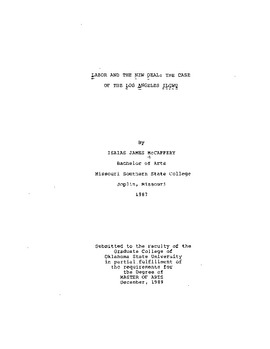| dc.description.abstract | This project examines the experience of a single labor union, the International Ladies' Garment Workers' Union (ILGWU), in Los Angeles during the New Deal era. Comparisons are drawn between local and national developments within the ILGWU and the American labor movement in general. Surprisingly little effort has been made to test prevailing historical interpretations within specific cities-- especially those lying outside of the industrial northeast. Until more localized research is undertaken, the unique organizational struggles of thousands of working men and women will remain ill-understood. Differences in regional politics, economics, ethnicity, and leadership defy the application of broad-based generalizations. The Los Angeles ILGWU offers an excellent example of a group that did not conform to national trends. While the labor movement experienced remarkable success throughout much of the United States, the Los Angeles garment locals failed to achieve their basic goals. Although eastern clothing workers won every important dispute with owners and bargained from a position of strength, their disunited southern Californian counterparts languished under the counterattacks of business interests. No significant gains in ILGWU membership occurred in Los Angeles after 1933, and the open shop survived well iii into the following decade. A powerful minority of cloak and dress manufacturers and a majority of sportswear producers never signed a labor contract. Many firms that recognized the union broke the terms of their agreements when it became clear that they could do so with near impunity. Wages and working conditions received modest improvement despite a series of violent strikes that created a tragic spectacle for Los Angeles residents. Overshadowed by other concerns, such as presidential campaigns, economic crises, and the growth of fascism abroad, these confrontations went almost unnoticed outside the state of California. | |
